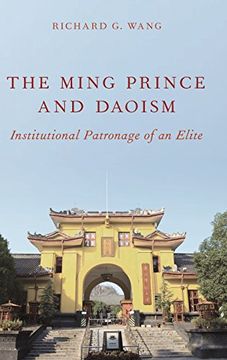Share
The Ming Prince and Daoism: Institutional Patronage of an Elite
Richard G. Wang (Author)
·
Oxford Univ Pr
· Hardcover
The Ming Prince and Daoism: Institutional Patronage of an Elite - Richard G. Wang
Choose the list to add your product or create one New List
✓ Product added successfully to the Wishlist.
Go to My Wishlists
Origin: U.S.A.
(Import costs included in the price)
It will be shipped from our warehouse between
Wednesday, June 19 and
Friday, July 05.
You will receive it anywhere in United Kingdom between 1 and 3 business days after shipment.
Synopsis "The Ming Prince and Daoism: Institutional Patronage of an Elite"
Scholars of Daoism in the Ming dynasty (1368-1644) have paid particular attention to the interaction between the court and certain Daoist priests and to the political results of such interaction; the focus has been on either emperors or Daoist masters. Yet in the Ming era, a special group of people patronized Daoism and Daoist establishments: these were the members of the imperial clan, who were enfeoffed as princes. By illuminating the role the Ming princes played in local religion, Richard G. Wang demonstrates in The Ming Prince and Daoism that the princedom served to mediate between official religious policy and the commoners' interests.In addition to personal belief and self-cultivation, a prince had other reasons to patronize Daoism. As the regional overlords, the Ming princes, like other local elites, saw financing and organizing temple affairs and rituals, patronizing Daoist priests, or collecting and producing Daoist books as a chance to maintain their influence and show off their power. The prosperity of Daoist institutions, which attracted many worshippers, also demonstrated the princes' political success. Locally, the Ming princes played an important cultural role as well by promoting the development of local religions. This book is the first to explore the interaction between Ming princes as religious patrons and local Daoism. Barred by imperial law from any serious political or military engagement, the Ming princes were ex officio managers of state rituals at the local level, with Daoist priests as key performers. Moreover, institutionally, most regular ceremonies related to a prince's life were mandated to be conducted by Daoist musician-dancers, and that as a result the princely courtly rites were characterized by a Daoist flavor. For this reason the princes became very closely involved in Daoist clerical and liturgical life.
- 0% (0)
- 0% (0)
- 0% (0)
- 0% (0)
- 0% (0)
All books in our catalog are Original.
The book is written in English.
The binding of this edition is Hardcover.
✓ Producto agregado correctamente al carro, Ir a Pagar.

